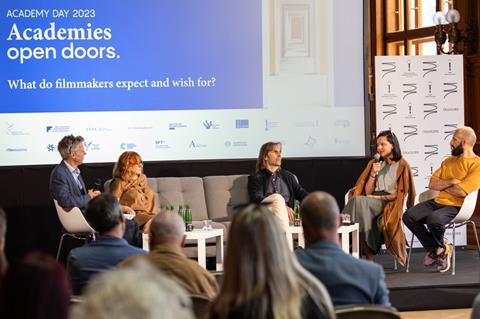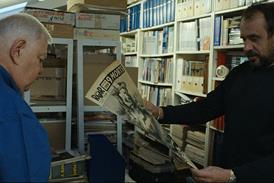
The current and future role of film academies was the topic of debate at a European Film Academy-hosted event, Academies Open Doors, held this week at the Karlovy Vary Film Festival.
Directors, producers and festival programmers revealed in one panel session what they expect from film academies, and what they would like academies to offer in the future, beyond glitzy award ceremonies.
The panel included Rada Sesic, who heads the documentary section of the Sarajevo Film Festival, Slovakian producer and consultant Katarina Tomkova, Italian director Mattia Colombo, whose documentary Pure Unknown premiered at Karlovy Vary, and Swiss director Thomas Imbach whose film Say God Bye had its world premiere at Karlovy Vary.
The panellists spoke of their desire for academies to provide educational tools for aspiring filmmakers, and also to lobby for more education about film in schools. They also called on academies to provide support and networking opportunities for young filmmakers.
Another topic of debate was the accessibility of academies themselves. Initiatives to support diversity and inclusion were also flagged as a priority. The panel said that it was important for academies to focus their attention on the regions, and not just on initiatives in capital cities.
The filmmakers also called for individual country academies to help promote European films and to build audiences for European films, and to share information and data through the European Film Academy.
Other ideas included championing documentaries, which many felt were unjustifiably overlooked as an art form compared to fiction features.
There was also debate about what an academy should actually stand for and what kinds of films it championed. Does providing members with dozens of films to watch and vote on during an awards season actually result in the best quality films winning?
A second panel session comprising academies from Europe outlined some of the initiatives they are involved in beyond organising awards.
The panel, which was hosted by European Film Academy chief executive Matthijs Wouter Knol, included Katharina Albrecht from the Austrian Film Academy, Dariusz Jablonski from the Polish Film Academy, Yann Tonnar from the Luxembourg Film Academy and Deirdre Hopkins from the UK’s Bafta.
Hopkins spelt out some of the many initiatives that the UK organisation offers beyond its award ceremonies, including scholarships, mentoring, networking, regional activities and sustainability platform Bafta Albert.
It was noted not all academies have the resources available to an organisation the size of Bafta.
However, Jablonski said that Europe’s film academies have 20,000 members between them who could help to “dictate the future of cinema.”
Panelists agreed academies could also lobby for a greater government commitment to support cultural initiatives – from film funding through audience development and education – within Europe.

























No comments yet